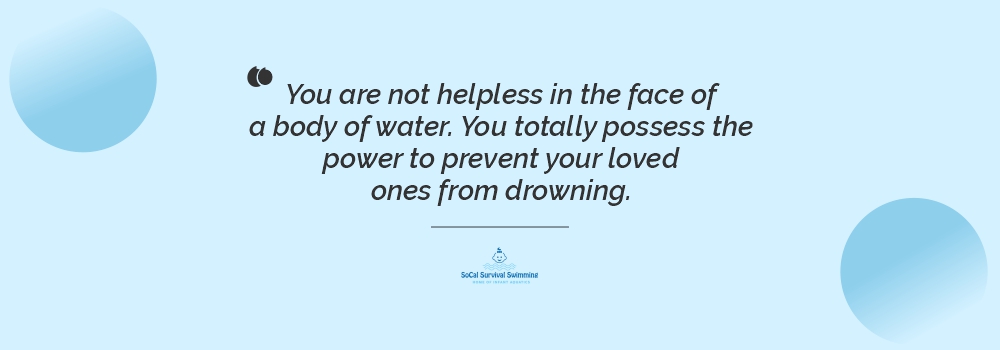Drowning is one of the biggest causes of preventable deaths in the world today, accounting for numerous fatalities every year. It is also an issue that has major impacts on children and youth, with children below five the age group most at risk. There are several reasons young children are at risk of drowning including—development, lifestyle, and environmental factors. Thus, prevention is essential because when someone starts to drown, the outcome is often fatal.
Here, survival often depends on the speed of removal from the water and how quickly proper revival can take place. Thus, embedding basic swimming and lifesaving education, skills, and leadership can make a real difference to communities around the world. Making such a difference, Jessica Box, an adroit business leader, and a certified Infant Aquatic Specialist has been helping infants and children of all ages master the lifesaving aquatic survival in just 3 to 6 weeks.
A Compelling Journey
When Jessica had her first daughter, she realized that she couldn’t be there at every moment watching her (which rings even more true presently as she has three young daughters). Both her mother and grandmother had pools and she relied on them to help with childcare—making it imperative for her children to know how to swim.
Jessica too was familiar with survival swimming as her aunt was an instructor. However, at that time, the closest survival swim instructor was 50 miles away. After a couple of months, Jessica, with her family, temporarily relocated to Boulder, Colorado—where she began and completed her training at Infant Aquatics headquarters. After earning her certification, Jessica founded SoCal Survival Swimming with an objective to reduce the number of childhood drownings through swim instruction and education.
Home of Infant Aquatics
Established in 2015, SoCal Survival Swimming empowers children with the skills needed to safely enjoy the water in a matter of weeks. It primarily offers two different programs—a 6-week survival swim program and maintenance/strokes classes. Babies as young as six months can participate in survival swim classes that are 1o minutes long, five days a week, for six weeks. At the end of six weeks, the child must pass the survival swim test which involves jumping into the pool fully clothed.
Multiple Roles and Responsibilities
Jessica is often found in the pool—from Monday to Thursday—teaching daily swim lessons. When not in the pool, she spends her time running the business side of SoCal Survival Swimming. This includes networking, organizing schedules, and coaching parents. “The majority of my students are referrals. So I spend a large chunk of my day talking to parents of prospective students and educating them about this life-saving program,” she adds.
She mentions that some parents have preconceived notions about survival swimming and are not familiar with the swim-float-swim method or have been misinformed. Thus, educating them on why these lessons are different than the ones they took growing up or maybe took their other children to—is a challenge for Jessica.
Additionally, Jessica runs a non-profit foundation ‘One Baby at a Time’. The goal of the foundation is to reduce the number of childhood drownings ‘one baby at a time’ and drive home a point that no child should die from drowning. The foundation serves as a drowning prevention educational resource providing advice, access to local instructors; a rating system for instructors; and a place for client reviews.
“Non-Essential” to “Essential”
The COVID-19 pandemic was indeed a setback for businesses across the world. Various methods adopted to combat the spread of the virus—such as social distancing and lockdowns—caused businesses to shut down operations except for essential services such as healthcare, food, etc. While the authorities included several services in the essential list, swimming lessons were not a part of those services.
Rattled by the decision, Jessica says, “When COVID-19 struck my business was shut down. I just couldn’t wrap my head around the idea that life-saving swimming lessons were not considered essential.” However, once the lessons were not available, it quickly became apparent that survival swimming lessons are not a luxury. Childhood drownings shot up across the nation with Florida experiencing a 70% spike compared to 2019. To get the business back running, Jessica and her team wrote letters to health officials and legislators asking for their support. Ultimately, SoCal Survival Swimming was declared essential and was free to open its doors for the little swimmers again.
Combating the Psychological Effect
The year 2020 changed the world in many ways, as well as had a psychological effect on people. When the pandemic first struck, it made several people helpless. They did not know how to protect their loved ones and themselves from the novel virus. While some of them hid, others became anxiety-ridden.
Addressing the mental health issue, Jessica adds, “One thing I always communicate about survival swimming is that drowning is completely preventable. You are not helpless in the face of a body of water. You totally possess the power to prevent your loved ones from drowning. The first step? Enroll them in survival swim.”
Survival Swimming; a Necessity
The survival swimming industry is now essential and Jessica and her team have spent time and effort to drive this point home. “From now on, we will never be considered a luxury or unnecessary, which will eventually change the mindset of the public at large. Now they will know that this is not an extracurricular activity—it is a necessity,” asserts Jessica.
As the world reopens, Jessica expects to be much busy this summer getting the little swimmers back in the pool and nailing down the swim-float-swim method.






